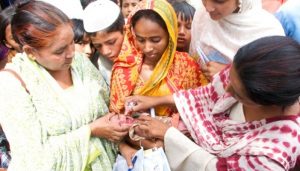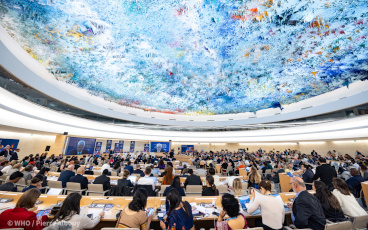Every child counts
A landmark polio project puts thousands of newborns on the map every month

In the teeming streets of Uttar Pradesh (UP), ensuring each of the estimated 38 million children in India’s most populous state is immunized remains one of the global polio eradication initiative’s greatest challenges. Here, more than 400 000 children are born every month and until recently, up to half those names were not making it onto the official government registry.
Week by week, mobile polio immunization teams, which literally walk from house to house throughout UP to ensure blanket immunization coverage, continue to find unregistered, unimmunized newborns. These infants are not only susceptible to contracting polio; they also act as a reservoir for the virus to survive in the community and make for inaccurate immunization coverage figures.
Seeking a solution, the National Polio Surveillance Project (NPSP) – a joint project of the Government of India and the World Health Organization – established the Tracking Every Newborn initiative, where individual immunization teams recorded the details of each newborn infant on their house-to-house visits, moments before giving them their first dose of oral polio vaccine. In a 12-month pilot project undertaken across one block in each of eight districts of western Uttar Pradesh, the names of all newborns were added – at the block level – to the immunization registers held by the local Auxiliary Nurse Midwives (ANMs). After six months, the number of registered infants had nearly doubled. Results from the eight pilot blocks showed that while the ANM’s registers had shown 16 569 newborn children, polio workers had confirmed an additional 15 742 newborn children – who now had access to routine immunization session in the villages.
This improvement made it possible to determine more accurate immunization coverage: for example, of the 32 311 infants that now appeared on the official register, only 60% had received a DPT3 (diphtheria, polio and tetanus) immunization.
The Tracking Every Newborn project has also motivated the community – from ANMs to polio teams to the parents themselves – to ensure that all newborn children are placed on the official register for immunization purposes. The success of the pilot phase of the project has led the Uttar Pradesh Government to request that the initiative be expanded to other blocks from March 2009, to ensure every child in Uttar Pradesh gets counted – because every child counts.













